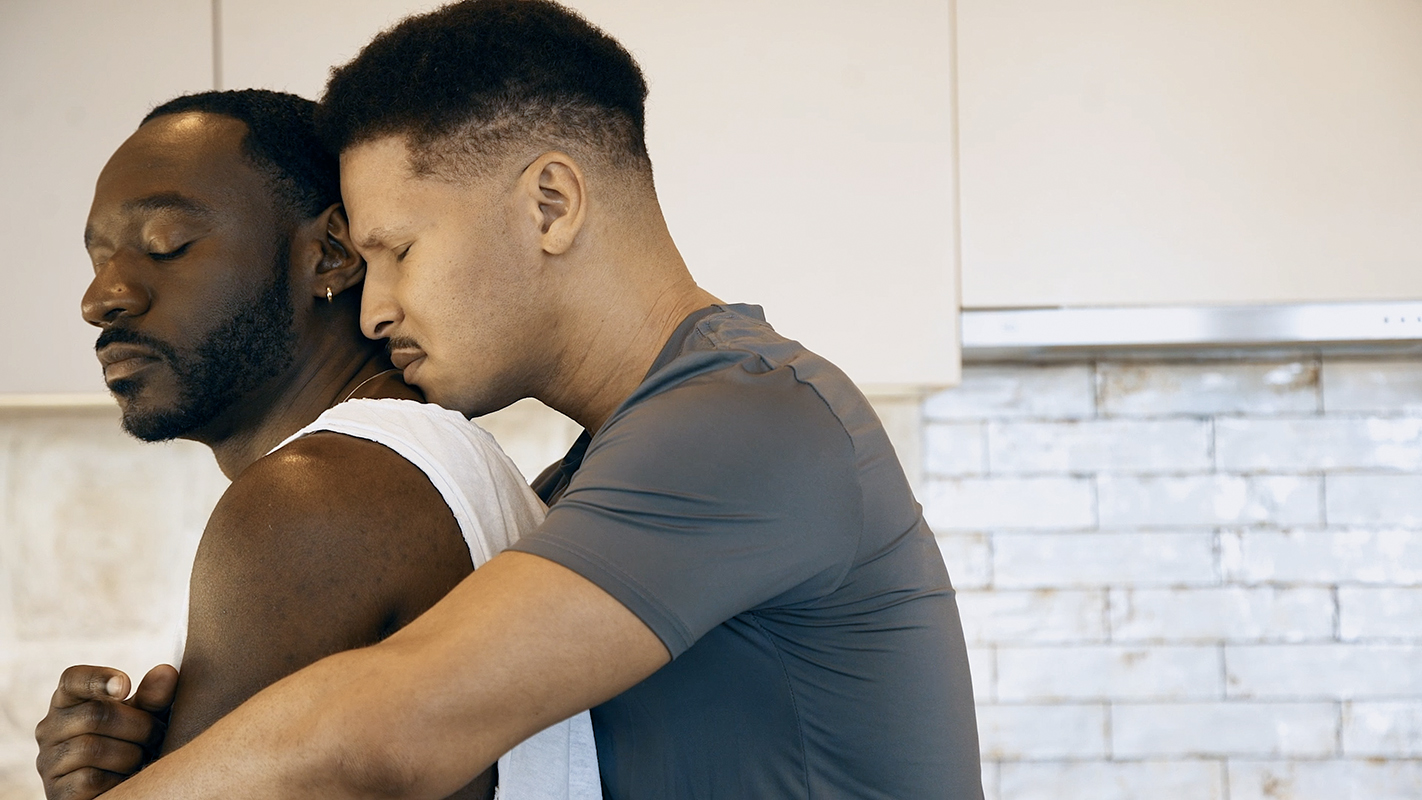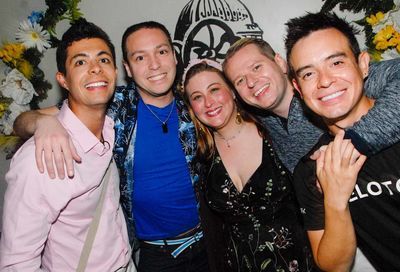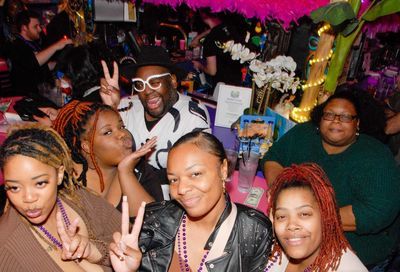What A Roe v. Wade Overturn Could Mean For LGBTQ Rights
With LGBTQ rights currently under attack, the potential repeal of reproductive rights is "a four-alarm fire for all Americans."

The panic level of equality advocates has reached a fever pitch following the leak of a draft of a U.S. Supreme Court opinion that appears poised to overturn Roe v. Wade. The 1973 landmark case effectively established the right of a pregnant person to obtain an abortion regardless of prior state laws on the books that may have restricted access to abortion-related services.
The leaked draft of the opinion, published by Politico on Monday night, set off waves of demonstrations throughout the country, with most organized by supporters of abortion rights wishing to express their displeasure with the court’s draft opinion. Penned by Associate Justice Samuel Alito, the opinion would, if published in its current form, overturn Roe and return power to individual states to regulate or ban abortions as elected representatives see fit.
On Tuesday, the Supreme Court confirmed that the draft opinion in Dobbs v. Jackson Women’s Health Organization, a case involving a challenge to a Mississippi abortion law that bans abortions after 15 weeks of viability, was authentic.
Chief Justice John Roberts, Jr. was so enraged by the leak that he directed the marshal of the court to investigate, calling the release of such information a “singular and egregious breach” of trust.
While supporters of keeping Roe intact were understandably outraged over what they believe is the beginning of the erosion of reproductive rights in the United States, another community expressing alarm over the decision is the LGBTQ community.
While some members of the community have already been targeted by various bills in more than two dozen states, others slowly began to realize that much of the legal reasoning that served as the basis of Roe is similar to the logic used in determining several pro-LGBTQ rulings by the high court. That includes Lawrence v. Texas, which overturned state bans outlawing same-sex intimacy, and Obergefell v. Hodges, which overturned bans on same-sex marriage.
“The draft opinion that was leaked and authenticated by the Supreme Court really represents a four-alarm fire for all Americans, every person in our country,” says Omar Gonzalez-Pagan, a senior attorney and health care strategist with Lambda Legal. “It is a frontal and nuclear assault on the liberty and autonomy of every person. It calls into question the right to privacy, the ability of people to define not only who they are, but to act in accordance with who they are in their homes.
“[The draft opinion] threatens not just the ability of people who are pregnant to terminate the pregnancy, but also the ability of people to protect and exercise their rights regarding contraception, marriage for same-sex couples, marriage for interracial couples, transgender rights, the ability to self-determine themselves and to protect their own autonomy in their bodies and themselves. All of that is called into question by this opinion.”
The leaked opinion is only a draft, not a final copy, but Gonzalez-Pagan said there’s no reason to not take Alito’s opinion at face value, given his dissents in other LGBTQ-related cases like Obergefell or Windsor, the latter of which overturned a part of the Defense of Marriage Act that denied federal recognition to same-sex marriages.
“Take a look at the language and the specific word choices that are used throughout this opinion,” says Gonzalez-Pagan. “Alito speaks of the interest in protecting potential life as to differentiating the right to abortion from these other rights that the opinion calls into question earlier.
“But by that very token, doesn’t contraception prevent potential life? It really is an opinion that is aimed by very careful wording to call into question the foundation and validity of every substantive right that helps all people function as themselves in our society for more than fifty years, not only post-Roe v. Wade, but before Roe v. Wade.”
The Human Rights Campaign, the nation’s largest LGBTQ civil rights organization, also warned of the far-reaching ramifications of any decision that curtails the rights granted by Roe, calling the leaked opinion a “wake-up call” for advocates of equality and vowing to defend LGBTQ rights at all costs.
“We’re at a dangerous, unprecedented moment,” Sarah Warbelow, the legal director for HRC, said in a statement. “This court is the most extreme and out-of-step in decades, and they have shown us where they want to go on abortion rights.
“This leaked ruling is outrageous and it is dangerous for women and all LGBTQ+ people – including queer people, many non-binary people, and transgender men, who need access to reproductive health care. And we know that all of our rights are now on the line.”
Kierra Johnson, executive director of the National LGBTQ Task Force, warned that Alito’s opinion, if finalized with few changes, has the potential to undermine or eventually lead to the overturn of other decisions benefitting LGBTQ people, people of color, and other groups whose rights were won after the Constitution was ratified.
“Today we must grapple with the real possibility that our highest court will not further equity and justice but instead choose to take away from more than half of the population in this country,” Johnson said in a statement. “I have devoted 25 years to advocating for reproductive justice, LGBTQ liberation and civil and human rights. I believe that each person deserves for their humanity to be affirmed, protected, and celebrated.
“So, like many of you, I am furious, but I am ready to do whatever is necessary to mobilize our communities to respond to this and make our voices heard not just today, not just election day, but every day.”
Cathy Renna, a spokesperson for the Task Force, noted that beyond access to abortion, contraception, and reproductive health care — all of which are important issues to the LGBTQ community, especially trans individuals — the possibility of overturning Roe should underscore the importance of political involvement.
“This may teach us that while we may have public opinion on our side, it doesn’t mean anything if we don’t put our power behind it. We really need to shift the debate. We really need to hold our leaders accountable. We need to use our voice — and our voice is the vote,” says Renna, alluding to the upcoming November midterm elections, which will determine control of Congress, governor’s mansions, and various state legislatures.
“I hope that people would think about themselves, the people in their lives, the people in their communities, the millions of people that will be directly and indirectly impacted if they overturn Roe v. Wade — access to contraception, marriage equality, sexual freedom, bodily autonomy,” says Renna. “If those things begin to get compromised and erode, then this is not the democracy we thought it was.”
“When I see what’s happening in reaction to this and people are saying things like, ‘marriage equality might be threatened’ or ‘we may become the target,’ we are already the target. Are you not paying attention? Has anybody turned on the TV or computer and looked at the news? Trans kids are being targeted in with hundreds of anti-trans bills around the country. Look at what’s happening in Florida with the ‘Don’t Say Gay’ law and the fallout from that. We are under attack. So what we need to do is not only get involved individually, but do what we can to get everyone around us involved. And the clock is ticking, because it’s May and November is coming fast.”
Victoria Kirby York, deputy executive director at the National Black Justice Coalition, called the potential overturn of Roe a “five-alarm threat to the civil rights of all Americans.”
“Make no mistake — no person should be forced to become a parent, take on the health and economic challenges of gestation, or give birth when doing so could kill them,” Kirby York says. “We are unequivocally for a pregnant person’s right to choose if, when, where, and how they parent, especially Black people who spent centuries in this country without those rights.
“If made binding, the language in this draft decision would set a horrible precedent not in line with the aspirations of equality that our nation seeks to achieve. Simply put, a narrowing of the 14th Amendment could put the right to interracial marriage, marriage equality for LGBTQ+ people, and other civil rights will be on the chopping block.”
Kirby York also acknowledged one of the obstacles to passing a law that protects the various rights that courts have carved out over time: the dedication of a small handful of Democrats — notably West Virginia Sen. Joe Manchin and Arizona Sen. Kyrsten Sinema — to maintaining he legislative filibuster in the U.S. Senate.
“If Congress is not able to break the filibuster and pass laws protecting voting rights and access to abortion, it will be up to the American people in November to ensure that the next Congress has the majorities it needs to do so,” she said. “We, the people, rule this country — and together, we must vote to protect abortion rights, and vote to ensure that the radical conservative majority on the Supreme Court is depowered.”
Heidi Beirich, the co-founder of the Global Project Against Hate and Extremism, warns that more Americans need to be cognizant of the threat that right-wing extremism, peddled by social conservatives, poses to various freedoms that Americans take for granted. In some instances, American evangelical groups attempted to export their agenda abroad by cozying up to religious leaders in Eastern Europe, Africa, and South America with the intent of attacking socially liberal people, secular individuals, non-Christians, and LGBTQ people.
“I don’t think a lot of Americans understand the many decades-long strategy of the far-right in this country, and they definitely don’t understand it in other countries,” Beirich says. “So they tend to segment off one issue from another, but they don’t get that there is a whole worldview here that wants to make our country look very, very different.
“The whole plan basically is to roll back the human rights advancements that have happened in the postwar period. And it’s not just in the United States. Here, we’re seeing in particular lately these horrible attacks on the trans community and trans youth, which is just the latest in the series of attacks coming from the Christian Right and social conservatives against the LGBTQ community.
“For me, what sits at the center of this worldview is a complete rejection of the idea that you can have a rights-protecting and rights-expanding diverse democracy,” she continues. “[The far-right’s] vision is very, very different. Their perspective is that, as they call it, the ‘natural family’ should have precedence, Christianity should have precedence. Women — maybe it’s not as strong as ‘they should be back in the kitchen,’ but they certainly shouldn’t have the kind of equality that a diverse democracy would advance. That’s their vision for the future.”
Some have brought attention to a section of Alito’s opinion in which the justice claims that overturning Roe does not mean the court will necessarily reverse other decisions granting rights to the LGBTQ community and other groups (despite railing against “unenumerated rights” earlier in the same opinion). Beirich accuses such people of trying to “gaslight” Americans by feigning reasonableness while moving forward with “an agenda that could result in the extreme curtailment of certain populations’ rights in this country.”
She continues: “Bodily autonomy aligns with human rights agendas, where you get to decide for yourself what to do with your body, how to live, etc. But that’s not how the far-right looks at the world.
“Ultimately, these people aren’t aligned with democracy. They’re aligned with their interpretation of the Bible. And they consider that to be the highest value, not freedoms and rights as enumerated in the Constitution or a document. Those things don’t matter to them. What they want to do is impose on all the rest of us their biblical vision of society, and that does not include bodily autonomy. And separation of church and state be damned, frankly, for them.”
Beirich adds that, in the United States, the Christian Right has been able to capitalize on the structure of the Senate — in which half of the senators in the upper chamber represent a loud yet vocal minority of people with strident views — as well as the way in which the Constitution distributes power to the states.
“The far-right has understood that power often exists in the statehouses because of the way our Constitution distributes power,” she says. “So you can make a stand in small, small, largely white states with far-right agendas. And you can actually control the U.S. Senate without representing majorities of the population. The far-right has been very, very sly about it and very, very strategic by staying with a couple of basic issues and driving themselves forward into power.”
Beirich says it’s everyone’s responsibility to inform concerned Americans of the ulterior motives of the Christian Right,
“It’s journalism’s responsibility to tell the truth about this trend,” she says. “It’s activists like myself and others to stand up against this. You know, it’s protesting, all those things to try to raise awareness.
“It’s not surprising that the other thing that the GOP has been doing lately is trying to shut down discussion in schools of controversial subjects. It’s mostly revolved around critical race theory, but anything about the LGBTQ community is always under attack from the Right, too, because they want people to be ignorant about these issues.”
Support Metro Weekly’s Journalism
These are challenging times for news organizations. And yet it’s crucial we stay active and provide vital resources and information to both our local readers and the world. So won’t you please take a moment and consider supporting Metro Weekly with a membership? For as little as $5 a month, you can help ensure Metro Weekly magazine and MetroWeekly.com remain free, viable resources as we provide the best, most diverse, culturally-resonant LGBTQ coverage in both the D.C. region and around the world. Memberships come with exclusive perks and discounts, your own personal digital delivery of each week’s magazine (and an archive), access to our Member's Lounge when it launches this fall, and exclusive members-only items like Metro Weekly Membership Mugs and Tote Bags! Check out all our membership levels here and please join us today!

























